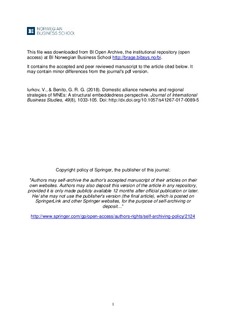Domestic Alliance Networks and Regional Strategies of MNEs: A Structural Embeddedness Perspective
Journal article, Peer reviewed
Accepted version
Permanent lenke
http://hdl.handle.net/11250/2574221Utgivelsesdato
2018Metadata
Vis full innførselSamlinger
- Publikasjoner fra CRIStin - BI [1039]
- Scientific articles [2217]
Originalversjon
Journal of International Business Studies, 2018, 49(8), 1033-1059 10.1057/s41267-017-0089-5Sammendrag
We draw on a social network perspective to explain multinational enterprises’ (MNEs) propensity to distribute their operations unevenly across various regions of the world. We focus on how the positioning of MNEs in their domestic network of strategic alliances affects their geographic scope, i.e., whether they concentrate on their home region or expand beyond it. We theorize that embeddedness in alliance networks constitutes a double-edged sword to the geographic scope of MNEs. Strong embeddedness in domestic alliance networks drives the development of location-bound firm-specific advantages (FSAs), which may narrow down MNEs’ geographic scope. In contrast, moderate embeddedness leads to more non-location-bound FSAs, which reduce liability of foreignness, and hence motivate MNEs to widen their geographical scope. We thus predict a non-linear relationship between domestic alliance network embeddedness and MNE geographic scope. Furthermore, the impact of the domestic alliance network on MNE geographic scope hinges on the organizational ability to efficiently and effectively absorb resources stemming from the network. We test our hypotheses using FDI data from 302 US MNEs in the information and communication technology industry for the period of 2001–2008, and generally find robust support for the hypothesized relationships.
